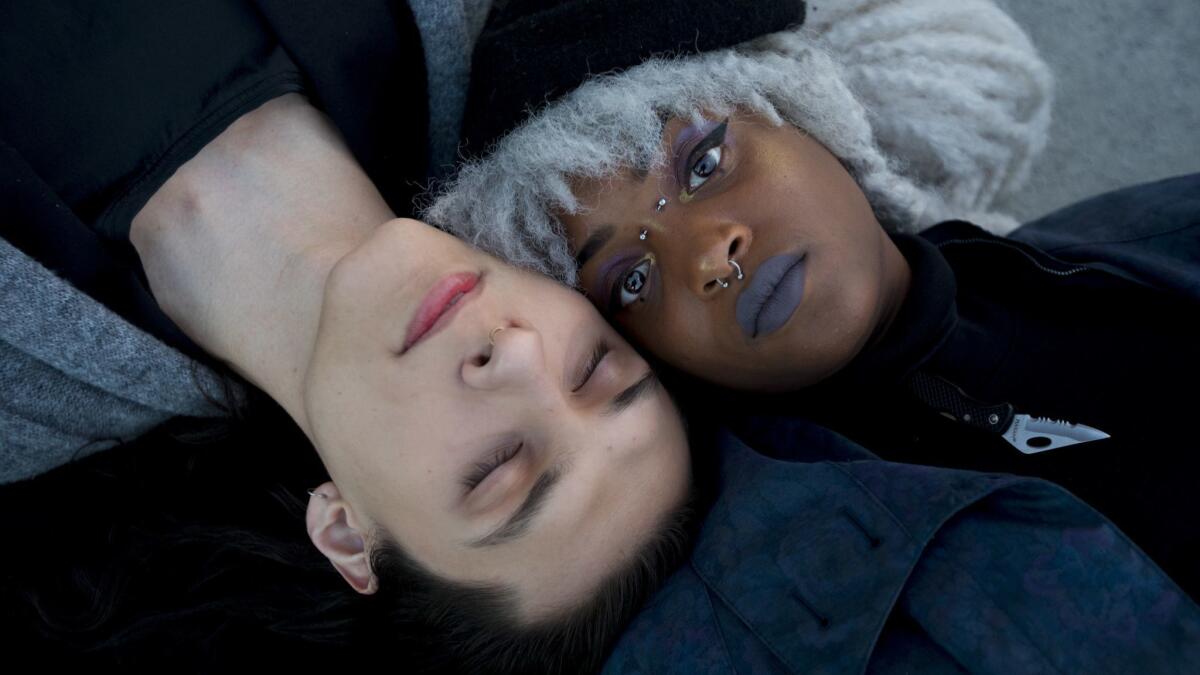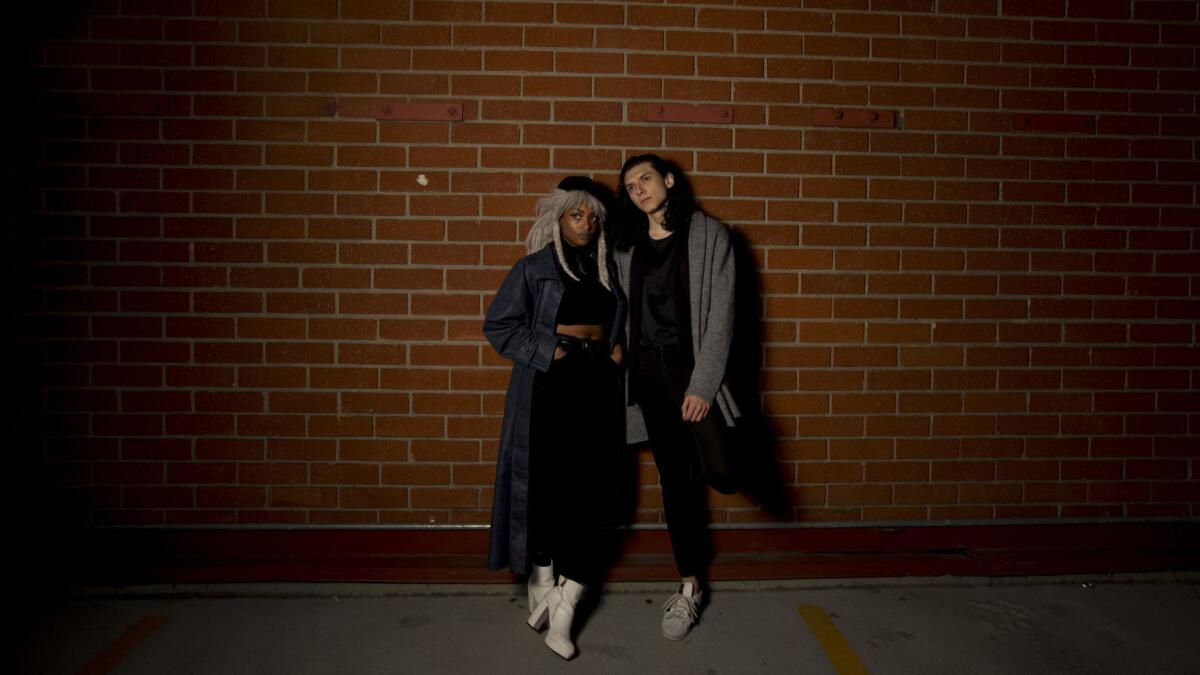Local R&B duo Closegood found themselves through music

Months ago, when the experimental R&B duo Closegood was working on its first singles, the pair recorded scores of demos trying to lock down its sound. Often, the two concluded that those vocal takes didn’t feel like their true selves.
Plenty of new artists go through similar doubts. But that self-discovery process had extra weight for Closegood. The duo, two trans producer-songwriters, were still figuring out the practical aspects of transitioning. One was matching your singing voice to your identity.
They’d have days where they’d come in and say, “I am dysphoric about my voice today. I don’t think I can sing, I don’t think I can record this,” producer Amada said. “But that’s another way that this is experimental music. I said, ‘OK, we’ll manipulate your voice, pitch it down, we’ll give you a completely different voice. It’s still you.’”
That process — using art and aesthetics to become more yourself — shows up in “Omen,” an autumnal soul-pop single where vocalist-producer Nyfe describes EQ’ing a track to “cut the treble from my voice ‘til boyhood feel close.”
“Choosing the way you present yourself, to be able to make those choices that ‘today we’re not going to be this,’” Amada added, “it’s still very real.”
With just a handful of singles and a new record, “Graven,” out next week, the L.A.-based Closegood has already found a compelling new voice in underground R&B. Their trans-ness does inform their writing, as does their experience with race, religion and outsider statuses of all kinds. But the music is so warm and generous that their search for meaning feels welcoming to anyone who wants to come along.
The 22-year-olds met at Pacific Union College, a small Adventist school in Napa Valley that, while isolating and often stultifying to them, was a crucible for finding and asserting themselves through music.
While they’d each been raised in the strict faith, music and literature gave them the language to push back against it.
“We were spending every day together,” Nyfe said. “The process of discovering art together built a lot of trust.”
A song like “Paperbag” documents the day-to-day grind of bigotry — “White boy look at black girl with tight curl like ‘Hoe I know you was not invited,’” Nyfe sings, in a cadence drawn from spoken-word poetry.
“I’m just a joke in the kitchen and above all the toxic religion / If you listen you can hear a girl choke on a prayer…Where your white friends at when you need one?”
“That was the first time I had ever been to a frat party and hearing people at the door say, with no shame, ‘Only let the black girls in if they look mixed,’” Nyfe said. “That was an interesting thing to say, because of the way that historically, in collegiate settings, you only have access to certain rooms. That had always been my experience with college, even if it wasn’t a race thing, it was a class thing, what your parents could afford.”
Their music emerged from that sense of being locked out of spaces, but also from discovering how art could could open up new ones. If “Omen” is about the wounds of life as an outsider, “Easy” is the flip side: an assertion that you’re worthy of affection regardless.
“I swear, I will be worthy of you wanting me,” Nyfe sings on the chorus. “I’m scared of you haunting my dreams / it seemed so unlikely I could be yours, I could be more than you asked for.”

The music — elegant drum machines, pitch-bent vocal samples and airy, lightly psychedelic synth sounds that have come to dominate certain corners of Spotify — are as inviting as a warm living room. It could have wide appeal among a Gen Z crowd that appreciates both lyrical candor and chilled-out sonics: comfort and radicalism strung together.
That knack for translating the particulars of their experiences to welcoming productions caught the ear of some high-profile collaborators. Anthony Kilhoffer, a Grammy-winning hip-hop producer who has worked with Kanye West, Travis Scott and John Legend, produced on “Graven,” and they recently signed with First Access Entertainment, which manages introspective crossover stars Young Thug, Lil Uzi Vert and Bebe Rexha.
Closegood’s popular potential has sometimes complicated the personal growth that enabled it, however. Amada’s public transition began just as the band released its first singles. Amada is forthright about that process, but the duo admit it’s surreal to have it coincide with a new public profile.
“Last week, I was thinking about posting one of the articles that mentioned us, and I realized that was probably me outing myself to my family on my Instagram story,” Amada said. “That there’s probably going to be people finding out about this right now, but I still have to promote this.”
But perhaps that’s the most relatable thing about Closegood. Making music, like gender and faith and so many other things in life, is about trial and error and giving yourself space to take different shapes until you find ones that fit.
“It’s daunting to say, ‘This is how I view myself in my head, this is what I want to sound like,’ and then start making the art and say, ‘Oh, it’s still shy compared to what I want.’ It’s always going to be a little scary,” Nyfe said.
Amada agreed, drawing a connection between transitioning and releasing such private, personal but extremely ambitious music. “I did not expect to be putting my face out there before transitioning or before dealing with those things, but I’m here now and have to be me in front of these people saying those things. It’s definitely been scary to say, ‘Oh, we’re actually doing this.’”
For breaking music news, follow @augustbrown on Twitter.
More to Read
The biggest entertainment stories
Get our big stories about Hollywood, film, television, music, arts, culture and more right in your inbox as soon as they publish.
You may occasionally receive promotional content from the Los Angeles Times.








